The HyperTexts
WILLIAM BLAKE: Influence, Importance and References in Popular Culture, Literature,
Songs, Films, Etc.
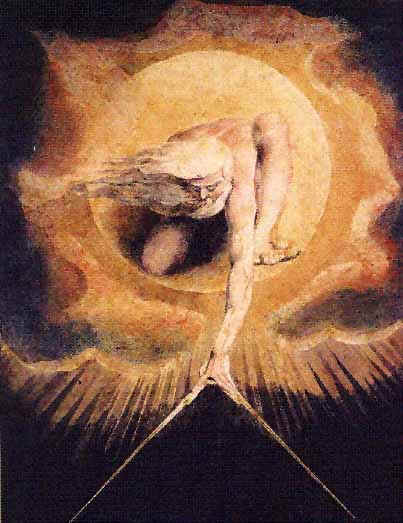
William Blake's "Ancient of Days"
Was William Blake the world's most important and most influential poet/artist of
all time? I will make the case that he was...
After all, Blake's influence on modern-day poets, songwriters, artists, filmmakers, novelists, cartoonists and
graphic novelists has been intense, ongoing and far-ranging. Thus, a strong case can be made for calling Blake the most important poet/artist of all time. (Possible rivals include Michelangelo and Dante Gabriel
Rossetti, but their poetry did not have the worldwide impact of Blake's.) Blake was the first genius to turn poetry and art into ideological weapons
to be hurled impactfully against the "establishment,"
or what Dwight D. Eisenhower would later call the "military-industrial complex." Blake coined a much more colorful term―"Satanic Mills"―by which I take him to mean the
three-headed hydra of State, Church and Industry. As a result, Blake became a major influence on reform-minded poets like Walt Whitman, William Butler Yeats, Alan Ginsberg, e. e. cummings and Pablo
Neruda. Later, Blake would also influence rebellious singer-songwriters like Bob Dylan, John Lennon, Paul McCartney, Jim Morrison, Mick Jagger, Keith Richards, Patti Smith, Kris Kristofferson, Joan Baez,
Joni Mitchell, Bruce Springsteen and Bono.
Many people who have never read William Blake have been influenced by him
through popular songs penned by his singer-songwriter disciples.
compiled by Michael R. Burch
Was William Blake the first Modernist Poet/Artist?
William Blake was undoubtedly a revolutionary poet and artist: but was he also the first Modernist?
Blake is considered to be one of the "Big Six" English Romantic poets,
along with William Wordsworth, Samuel Taylor Coleridge, Lord Byron, Percy Bysshe
Shelley and John Keats. If so, that makes Blake the first of the great English
Romantic poets, since he was the eldest: born in 1757, thirteen years before
Wordsworth. However, while Blake shares a number of similarities with the other
great English Romantics, I think he goes beyond them in breaking with the past
and forging forward in entirely new directions. Blake was not one to praise God
or Nature, nor to write about knights, chivalry, honor and adventures. He chose to break ground in
other areas. One of the hallmarks of modernist art is a break with
the past. We can clearly see such breaks in Blake's poetry and art. Another hallmark of modernist art is invention: doing
things in nontraditional ways. Here, Blake was on the cutting edge as well. For
instance, Alicia Oistriker, a leading Blake authority and editor of the
Penguin Complete Poems of William Blake, claims that "The Argument" (plate
2) of the "Marriage of Heaven and Hell" is the first example of free verse in
the English language. Blake also employed slant rhymes and metrical variation in some of his
more traditional poems, perhaps blazing new
trails for other poets to follow, such as Emily Dickinson, Wilfred Owen and
cummings. And then there
are Blake's innovations and inventions related to his engravings. A third
hallmark of modernism is a focus on the individual and his/her
imagination. Here again, Blake was a trendsetter. While other poets praised
Christ or were at least careful not to say anything too heretical in public, Blake
brazenly declared him to be his own Christ, while dismissing the father-god of
the Bible as "Nobodaddy." That was beyond revolutionary for Blake's time (and
perhaps still for ours). In this regard, Blake may have helped pave the way for Whitman.
Critical Acclaim
• Blake was ranked 38th in a BBC poll of the hundred greatest Britons. The only British poet ranked higher was Shakespeare. No British artist was ranked higher.
• Eminent men of letters―William Wordsworth, Samuel
Taylor Coleridge, A. E. Housman, Walter Savage Landor, Edward FitzGerald, to name a few―recognized Blake’s talent.
• Housman identified Blake as the first major English poet after John Milton.
• Harold Bloom, perhaps the preeminent literary critic of our day, agreed with
Housman, saying: "Blake's
poems, especially his epics, seem to me the best poetry in English since
Milton."
• Charles Lamb, who met Blake and published
his poems, called him "one of the most extraordinary persons of [his] age."
• Alexander Gilchrist, Blake's first biographer, called him "a man of genius" and
a "most extraordinary man."
• William Wordsworth said the "madness" of Blake interested him more than the
sanity of Lord Byron and Walter Scott.
• Algernon Charles Swinburne claimed Blake's work was the height of 18th
century poetry, using sweeping superlatives.
• Jonathan Jones, an art critic, has proclaimed Blake "far and away the greatest
artist Britain has ever produced."
• Edward Larrissy asserted that "Blake is the Romantic writer who has exerted the
most powerful influence on the twentieth century."
• T. S. Eliot wrote that Blake's poetry has "a peculiar honesty, which, in a world
too frightened to be honest, is peculiarly terrifying. It is an honesty against
which the whole world conspires, because it is unpleasant."
• T. S. Eliot also mentioned Blake's "immense power of assimilation."
• Northrop Frye called Blake the "finest gnomic artist in English literature" and
hailed his "genius for crystallization."
• "Contempt and Horror have never been more clearly spoken in English poetry,"
Frye said of Blake's Songs of Experience.
• Frye also said: "Blake makes an immense appeal to a great variety of people
outside the academic profession."
• According to Stanislaus Joyce, James Joyce's "gods were Blake and Dante."
• William Blake's wife said: "I have very little of Mr. Blake’s company; he is
always in Paradise."
• William Rossetti called Blake a "glorious luminary," and described him as "a man
not forestalled by predecessors, nor to be classed with contemporaries, nor to
be replaced by known or readily surmisable successors."
• In his Life of William Blake (1863), Alexander Gilchrist warned readers
that Blake "neither wrote nor drew for the many, hardly for work'y-day men at
all, rather for children and angels; himself 'a divine child,' whose playthings
were sun, moon, and stars, the heavens and the earth."
Writers, Songwriters and Artists influenced by William Blake
Singer/Songwriters, Musicians and Bands
Bob Dylan
The Beatles
John Lennon
Paul McCartney
George Harrison
Ringo Starr
The Rolling Stones
Mick Jagger
Keith Richards
Van Morrison
Jim Morrison and the
Doors, esp. "End of Night"
Patti Smith, esp. "My Blakean Year"
Kris Kristofferson
Bono and U2, esp. "The Joshua Tree"
Led Zeppelin, esp. "Achilles Last Stand"
Richard Ashcroft and The Verve, esp., "History" and "Love is
Noise"
Visual Artists, esp. the pre-Raphaelites
John
Everett Millais
Dante Gabriel Rossetti
William Rossetti
G. F. Watts
Novelists
James Joyce
Jack Kerouac
William S. Burroughs, esp. Naked Lunch
C. S. Lewis, esp. The Great Divorce
Aldous Huxley, esp. The Doors of Perception
Salman Rushdie, esp. The Satanic Verses
Phillip Pullman, esp. His Dark Materials
Orson Scott Card, esp. The Tales of Alvin Maker
Thomas Harris, esp. Red Dragon and
Hannibal
Graphic Novelists and Cartoonists
Alan Moore, esp. Watchmen and V for
Vendetta
Todd McFarlane, esp. Spawn
Grant Morrison, esp. Invisibles
Bill Watterson, Calvin and Hobbes
Filmmakers
Martin Scorsese, esp. Mean Streets
Poets, especially the Romantics, pre-Raphaelites and Beat Poets
Allen Ginsberg, for whom Blake was both Muse and Catalyst, appearing in
visions
Michael McClure also saw Blake in visions
Percy Bysshe Shelley
Algernon Charles Swinburne
Dante Gabriel Rossetti
William Butler Yeats
T. S. Eliot
Walt Whitman (his crypt was
modeled after Blake's "Death's Door" engraving)
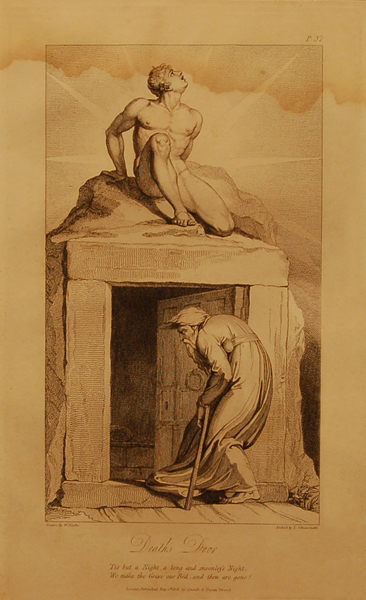
William Blake "Death's Door"
Movements influenced by William Blake
Romanticism and Neo-Romanticism
Modernism and Post-Modernism
Surrealism
Psychedelic Art
Abolitionism (Blake created some of the earliest graphic anti-slavery art on
record)
Feminism
The Underground Movement
The Counter-Culture
The Anti-War and Free Love Movements (i.e., "make love, not war.")
The Hippies and Flower Power
References to William Blake in Poetry, Literature, Art and Music
According to John Lennon's FBI files, when the
"fantastically nervous" Beatles met Bob Dylan for the first time, there was
an uncomfortable initial silence, broken by Lennon snarling an insult at Allen Ginsburg.
But the unperturbed
Beat poet plopped himself down in Lennon's
lap, looked up and asked him, "Have you ever read William Blake, young
man?" Lennon, in his best "Liverpudlian deadpan" replied, "Never heard of the
man." But his wife Cynthia chided him, "Oh, John, stop lying!" and that "broke the ice."
Jim
Morrison and the Doors named their group after Blake's "Doors of Perception."
Blake's poem "Jerusalem" became a well-loved Christian hymn.
"Jerusalem" also inspired the title of the movie Chariots of Fire.
Joni Mitchell's "Taming the Tiger" refers to Blakes famous poem "The Tyger."
Joan Baez has done a reading of Blake's famous poem "London."
Marilyn Manson has done a public performance of Blake's "The Proverbs of Hell."
Johnny Depp has done a performance of Blake's "Doors of Perception."
Led Zeppelin's song "Achilles Last Stand" was influenced by Robert Plant's
reading of Blake's "The Dance of Albion."
Salman Rushdie referred to Blake's "The Marriage of Heaven and Hell" in his
best-known novel, The Satanic Verses.
Phillip Pullman has said that His Dark
Materials was influenced by Blake.
Orson Scott Card has referred to Blake in his work.
The modern graphic novel can clearly trace its
roots to Blake's illuminated poems and prophetic books.
Its seems likely that
every major anti-war and anti-orthodoxy figure since Blake has been influenced
to some degree by him.
Bob Dylan collaborated with Allen Ginsberg to record two Blake songs.
Allen Ginsberg
claimed that Blake's spirit had communicated musical settings of several Blake poems
to him.
In 1948 Ginsberg had an auditory hallucination of Blake reading his poems "Ah,
Sunflower," "The Sick Rose," and "Little Girl Lost" (later referred to as his
"Blake vision").
Patti Smith was heavily influenced by Blake, referring to him
in her song "My Blakean Year" and also reciting his poetry
before some of her songs.
Allen Ginsberg has done a musical performance of Blake's "Nurse's Song."
William Rossetti called Blake a "glorious luminary," and described him as "a man
not forestalled by predecessors, nor to be classed with contemporaries, nor to
be replaced by known or readily surmisable successors."
William Blake was a student of the Bible, but a fierce critic of the black-robed priests of Orthodoxy who
condemned human beings to "hell" in the name of God. Today it seems Blake has been vindicated. The Bible published by the Roman
Catholic Church, the New American Bible Revised Edition, doesn't contain a single mention of the word "hell." The Holman Christian
Standard Bible, published by the famously literal Southern Baptist Convention, barely mentions "hell." If this interests
you, please read why "hell" is vanishing from the Bible.
According to Blake, human society and its institutions were sick, and the cure
required a combination of revelation, imagination, right thinking, compassion,
fierce tenacity and love. He believed the black-robed priests of religion had
nailed a "thou shalt not" sign over the garden of earthly delights, robbing
adults of pleasure and children of hope. He vowed to not let his pen rest in his
hand until he had won the "Mental Fight" to transform the dreary London of his
day into a new Jerusalem. Today, as we witness the suffering inflicted on
innocent children all around the globe in the name of state, industry and
religion, it behooves us to consider joining that Mental Fight on the side of
Blake and his Rebel Angels.
![[Blake Print - Jacob's Ladder]](images/William%20Blake%20Jacobs%20Ladder.jpg)
William Blake's "Jacob's Ladder"
Blake's Importance
In my opinion William Blake (1757-1827) is the most important poet of all time. Why? Because
he helped change the world and in changing the world he saved many innocent children
from lives of drudgery and misery terminated by premature deaths. While he wrote many
wonderful poems and was also a talented painter, printer and engraver, what
makes Blake the most important of poets and artists is the change his work wrought in human
hearts, minds and consciences. No great poet ever wrote more compassionately (or more often)
about children. For instance, take this poem of Blake's, one of
the loveliest lullabies in the English language:
Cradle Song
Sleep, sleep, beauty bright,
Dreaming in the joys of night;
Sleep, sleep; in thy sleep
Little sorrows sit and weep.
Sweet babe, in thy face
Soft desires I can trace,
Secret joys and secret smiles,
Little pretty infant wiles.
As thy softest limbs I feel
Smiles as of the morning steal
O'er thy cheek, and o'er thy breast
Where thy little heart doth rest.
O the cunning wiles that creep
In thy little heart asleep!
When thy little heart doth wake,
Then the dreadful night shall break.
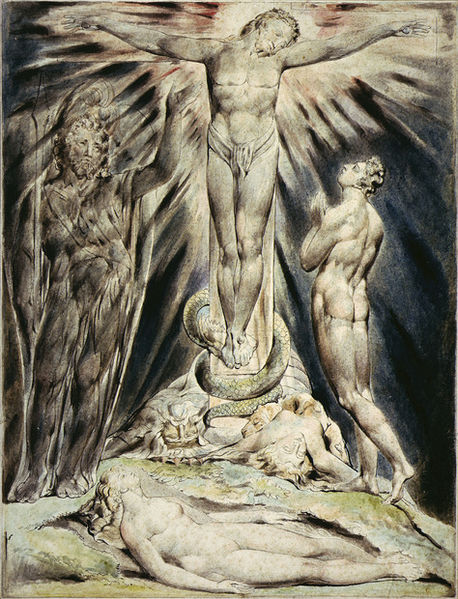
William Blake's "Michael Foretells the Crucifixion"
How, exactly, did Black rock the foundations of the world? By being a social
critic and reformer akin to the
Hebrew prophets. Here, for instance, is his bleak vision of the London of his day:
London
I wander thro' each charter'd street,
Near where the charter'd Thames does flow,
And mark in every face I meet
Marks of weakness, marks of woe.
In every cry of every Man,
In every Infant's cry of fear,
In every voice, in every ban,
The mind-forg'd manacles I hear.
How the Chimney-sweeper's cry
Every blackning Church appalls,
And the hapless Soldier's sigh
Runs in blood down Palace walls.
But most thro' midnight streets I hear
How the youthful Harlot's curse
Blasts the new-born Infant's tear
And blights with plagues the Marriage hearse.
Blake was a fierce critic of
what Dwight D. Eisenhower would later call "the military-industrial complex." Blake
had a more evocative term for factories that churned out implements of war
and death: he called them "Satanic mills." Blake is thus the forefather of virtually
every singer-songwriter who ever wrote a protest song. Before Blake, few poets
and minstrels had the nerve to criticize church and state. After Blake, many of
them would come to consider dissent a sacred task. Songwriters who followed in Blake's
footsteps as critics of the military-industrial complex include Bob Dylan, John
Lennon, Joni Mitchell, Joan Baez, Marvin Gaye, Billy Joel and Bruce Springsteen.
Blake's Continuing Influence
According to Narelle Doe, "Blake
still influences contemporary creativity and ideas. He is seen by many as one of
the great synthesisers of cultural experience, attracting a myriad of followers
with interests ranging from literature, painting, book design, politics,
mysticism, philosophy, mythology through to music and film making ... John
Everett Millais, Dante Gabriel Rossetti and G. F. Watts are just some of the
Victorian artists [influenced by Blake] ... From the 1960s onward, writers,
musicians and film makers like Allen Ginsberg, Bob Dylan, Jim Morrison of the
Doors and John Lennon adopted Blake as a mystical seer and anti-establishment
activist." Blake's influence on modern art can easily be discerned in the following images, which have obviously inspired
many comic book artists and graphic novelists. And it seems safe to say
that the illustrators for the Lord of the Rings, Conan the
Barbarian and similar books have also been heavily influenced by William
Blake.
![[Blake Print - Hecate]](images/William%20Blake%20Hecate.jpg)
William Blake's "Hecate"
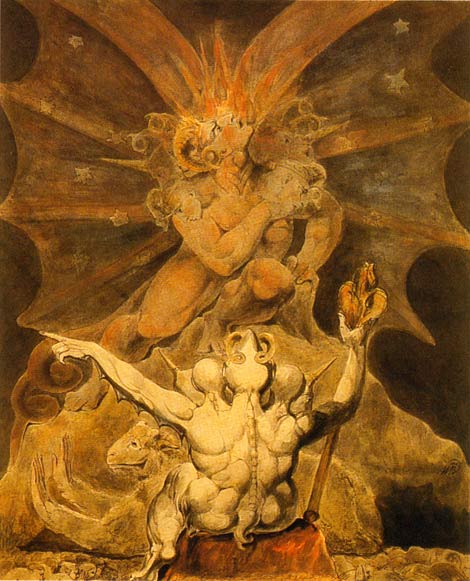
William Blake's "The Number of the Beast is 666"
It's interesting that Blake was the first "connection" and "ice breaker" between
Bob Dylan, John Lennon and
Allen Ginsburg. Why did such super-hip modern dissident artists admire Blake? Probably because they were idealists longing for Utopia (or, at the
very least, for radical social change) and Blake had urged his readers to cast off the "mind-forged
manacles" of hidebound religious and political thinking, in order to
change the dreary London of his day into a Mecca he called Jerusalem:
Jerusalem
And did those feet in ancient time
Walk upon England's mountains green?
And was the holy Lamb of God
On England's pleasant pastures seen?
And did the Countenance Divine
Shine forth upon our clouded hills?
And was Jerusalem builded here
Among these dark Satanic mills?
Bring me my bow of burning gold:
Bring me my arrows of desire:
Bring me my spear: O clouds unfold!
Bring me my chariot of fire.
I will not cease from mental fight,
Nor shall my sword sleep in my hand
Till we have built Jerusalem
In England's green and pleasant land.
Please note that Blake said "till we have built
Jerusalem." Blake's "Jerusalem" is based on the legend that Jesus once visited
England as a boy or young man. But what is most surprising about the poem is
Blake's activism. He didn't just mope and complain about the problems he saw: he
called for his spiritual and intellectual weaponry, vowing not to let his
"sword" (i.e., his pen) sleep in his hand until London had become the new
Jerusalem. The poem was later turned into a stirring hymn (one of my mother's
favorites).
Blake and Social Progress
When I say that Blake was the most important poet and artist,
I am not suggesting that he wrote the greatest poems or created the
greatest works of visual art. What I am suggesting is that Blake had the most influence on other poets and artists, and on the
greater world, especially in terms of social progress. Much of the world's progress
depends on how it treats children, because they form the foundation of each new
human generation. So Blake's advocacy of children's rights, at a time
when many children were treated like slaves (or were slaves) was of prime
importance in the development of the modern world.
Was Blake successful? Indeed, because today we have child labor laws, and most
children in Western nations don't get "real jobs" until age eighteen or older.
This gives them a considerable amount of time to play and learn, before they
assume adult responsibilities. Of course Blake was not the only child advocate among writers
and artists. Charles
Dickens was obviously also very influential, as were other
reformers. But Blake preceded Dickens by more than half a century, and when
Dylan met Lennon, they discussed Blake, not Dickens. Blake was the
first great writer to make children's rights a primary focus of his work. I
love and admire him for that. And as we will see together, he was also one of the first
abolitionists, creating some of the first graphic images of the horrors of
slavery.
W. H. Auden once said that "poetry makes nothing happen." But
if we consider the Bible to be poetry and the Hebrew prophets to be poets (much
of the Bible was recorded originally as poetry), it becomes obvious that a certain type of poetry can
make major things happen. And of all the major Western poets, Blake comes closest to
the Hebrew prophets in demanding social reform.
The Tenderness, Passion and Intellectual Energy of Blake
Blake was also unique among Western poets in that he was writer of surpassing
tenderness and yet was able to summon and channel tremendous passion and
intellectual energy. Other poets may have been as tender: Robert Burns and
Auden, for instance. Other poets may have "channeled fire," as did Dante,
Shakespeare and Milton. But few poets have combined such tenderness and
passionate energy (although Walt Whitman, e. e. cummings and Hart Crane come to
mind as heirs of Blake in this regard). Of the poets who followed Blake, Whitman
seems closest to him in spirit and message. Of the poets who preceded him, the
Hebrew prophets and Milton seem closest to Blake.
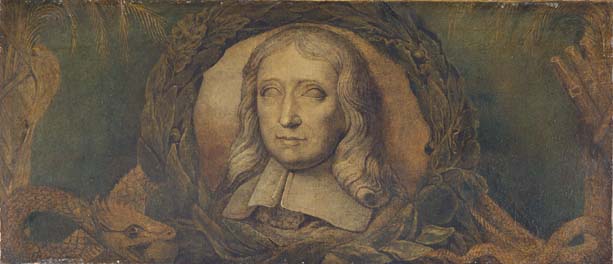
William Blake's "Portrait of Milton"
Poetic Force
Newton's equation tells us that force is the product of mass and
acceleration: a truck travelling at sixty miles per hour has much more force
than a feather pillow travelling at the same speed. I believe a similar
law applies to poetry. Poetic force is the product of mass (audience) and
acceleration (excitement or movement). A poet who excites and moves only a few readers
doesn't have as much poetic force as a poet who excites and moves larger
audiences. Hart Crane and Wallace Stevens were undoubtedly great poets capable of
tremendously exciting and moving audiences, but today those audiences are
relatively small. Homer, Shakespeare and Milton have excited and moved much
larger audiences: hence they have more poetic force. But audiences moved by
Homer, Shakespeare and Milton don't usually put down their poems and decide to
change the world. People who read Blake's work and took it to heart, sometimes did.
So I consider Blake a poet of great force, in the arena
of social change. Other
poets who have affected large audiences in the realm of social change include
Walt Whitman, Wilfred Owen, Bob Dylan and John Lennon. If we include poetic
sermons and speeches, Dr. Martin Luther King Jr. and Abraham Lincoln would also
be poets of the first rank.
Blake, the Prophet
To find a visionary as revolutionary as Blake, we would have to consider the
major prophets of various religions, but in many cases their words have been
altered for nefarious purposes (for instance, by charlatans who purport to
"save" human beings from an illusory "hell" in order to acquire fame, fortune
and power for themselves). But because Blake engraved and printed his own work,
we have his thoughts in an unadulterated form. He left us his words
etched in metal!
The Uniqueness of Blake
In many ways Blake was first, and unique. He was the most visionary,
mystical and prophetic of the major Western poets. And he appeared at just the
right moment in time to become tremendously influential in changing the way
people thought, because during his lifetime more and more people were beginning to
question the "infallibility" of the Bible and the "divine right of kings."
According to the Bible, (1) kings were appointed by God, (2) women and
children were ordained by God to be subservient to men, (3) sex was
"evil" unless sanctioned by marriage, and (4) serfdom and slavery had been
instituted by God and Moses. But the Bible was like a house of cards. If a
single verse could be proven incorrect, then it was up to human beings to decide
which verses to believe, if any. As science proved one biblical "fact" after
another to be incorrect, the authority of the Bible was undermined and the house
of cards began to collapse. Free thinkers began to interpret the Bible as they
preferred, either ignoring or "rehabilitating" verses that offended them, or in some
cases becoming agnostics and atheists.
Thus it became possible to reject the orthodox ideas that extramarital sex
was "evil," that kings and lords had the "right" to use and abuse serfs,
that men had the "right" to use and abuse women and children, and that some men
had the "right" to own other men. If God had not
uttered every word of the Bible infallibly, or if parts of the Bible had been
"doctored" by men, then people had to listen to their own hearts and minds, interpret
what they read, and draw their own conclusions. But of course this was the last
thing kings, lords, and the clergy wanted. So the forces of orthodoxy began to
confront these strange new ideas of individual interpretation and freedom of
conscience. Chaos and revolution were in the air. Poets, writers and artists
would greatly influence how the "people in the streets" came to think, and act.
The initial poetic dissent may have originated with John Milton, who in trying to
"justify the ways of God to man" had turned Satan, Adam and Eve into rebellious
heroes for the ages. Blake, an intuitive genius, once remarked that Milton was
of the "Devil's party" without knowing it, which Blake intended as a compliment.
However, Blake didn't see God as the enemy, but rather organized religion, which
according to him had
subverted true religion, which he saw personified in Jesus Christ. If organized
religion was the enemy, then perhaps Milton's rebellious "fallen" angels were
freedom fighters, like the American and French revolutionists. But Blake was a
compassionate man who abhorred violence and when he saw the terrible excesses of
the French Revolution, he soon distanced himself from men like Robespierre.
Poets and artists, for the most part, would come to advocate methods of social
change that did not involve violence, torture, murder and war. There would be a
progression of thinking from Blake/Wordsworth/Shelley to Emerson/Whitman
/Thoreau to Gandhi/King/Mandela to Dylan/Lennon/Baez that might be summed up in
these words from a Beatles song: "You say you want a revolution? We all want to
change the world. But if you talk about destruction, don't you know that you can
count me out? You know it's gonna be ... alright." This idea that the world
could be transformed through a revolution that did not involve violence and
would lead to a day when things would be "alright" has its genesis in the work
of Blake.
Blake, the Satanist?
While Blake has been accused of being a "Satanist," I don't think that's
strictly true. Blake was so strongly opposed to the errors of orthodox Christianity that
he believed rebellion was necessary. And he seemed to believe, as many mystics
do,
in the "inner light" or the "Christ within." He may have
seen man as both Christ and Satan, with Christ representing purity and
innocence, and Satan representing experience. But I see no evidence that
Blake "worshipped" either Christ or Satan, in the sense of bowing down to them and
pledging allegiance. For Blake religion was more a matter of transformation
and becoming, than a matter of theology. As with many mystics, it seems
likely that Blake thought of the Christ within himself, not as some remote
figure to "believe" in and fawn over.
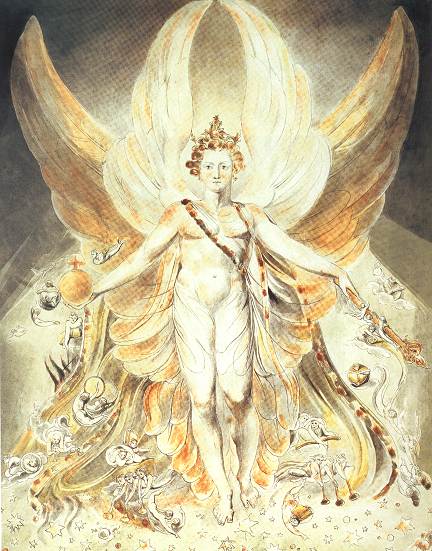
William Blake's "Satan in Glory"
Blake seemed to either believe or at least "work from" the Biblical account of
God creating Adam and Eve, after which some sort of sexual imbroglio involving
Satan resulted in the "fall." Or at least the images below suggest something along
those lines. In the first image, the Creator prays and/or rests after having created
the earth. In the second image, Satan handles (fondles?) a snake while watching Adam and Eve kiss,
suggesting that Satan's motive for tempting Eve was sexual. In the third image
Adam seems to be sleeping (perhaps because he's worn out from having sex?),
while Eve cavorts with "Satan's snake."
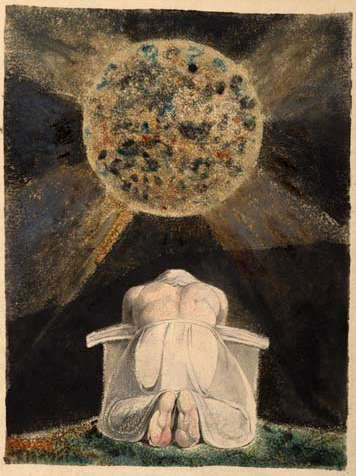
William Blake "The Song of Los"
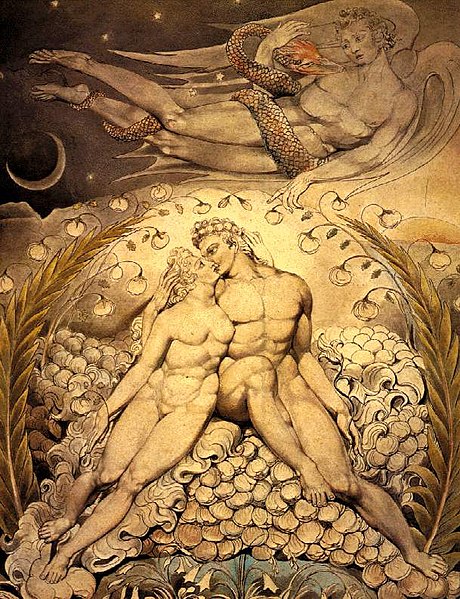
William Blake's "Sata Amor Adao Eva"
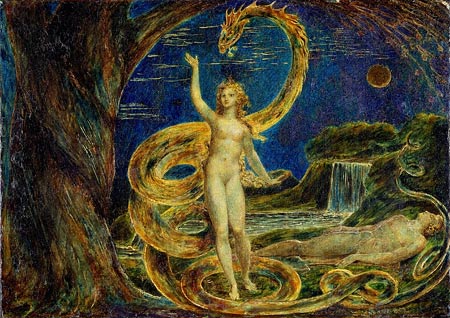
William Blake's "Eve Tempted by the Serpent"
With Blake's imaginative reinterpretation of Milton, Satan, Jesus, the Bible and
Christianity, an English
"Romantic" movement began to form and soon expressed itself: primarily through poetry,
prose and art. England managed to avoid the more violent extremes of the
American and French Revolutions, but the desire for freedom and equality burned
just as heatedly in English breasts as it did in those of Americans and
Frenchmen. So it's not surprising that England produced six of its greatest
poets within a relatively short period of time: first Blake, then Wordsworth,
Coleridge, Byron, Shelley and Keats. To the "big six" I would add the great
Scottish bard, Robert Burns. Each of the seven seemed to coin a new, man-centric religion. Each
was to some degree a heir of Blake's reinterpreted Milton. Within a few years,
other strikingly unique voices would emerge, chief among them Walt Whitman, a
romantic poet-prophet in the vein of Blake. Like Blake, Whitman was a mystic,
with a belief in the "oneness" and equality of all life. Blake must
have made a definite impression on Whitman, as Whitman had his
death-crypt modeled after Blake's "Death's Door."
Blake, the First Poet of Equality
Equality is a staggering concept. Perhaps Blake intuitively "got" it before most
of his contemporaries. Equality is counter-intuitive because there is no
equality in the wild. In a pride of lions the dominant male gets the choicest
meat and a harem of females. Even among herbivores the stronger males often dominate,
drive off or kill the weaker males.
But something fundamental had begun to change in human society: perhaps man had
overcome his environment to such an extent that the rules of nature were no
longer necessary. And if all human beings are "created equal," then
obviously kings, lords, clergy and businessmen have no right to use and abuse women and
children. A monumental "sea change" was about to take place, in the way Western
nations judged the people in power. In the past, a king might have been judged, to
some degree, by how he treated the men who "mattered." But after Blake and the
Romantics shook the foundations of the world, the people in power would also be
judged by how they treated women, children, serfs and slaves. While it would
take some time for the change to "take hold" (and indeed there is still
a good degree of "slippage"
today, as some Western nations still resist giving fully equal rights to
non-heterosexuals and Muslims), the suddenness of the change in the way poets
thought can quite easily be discerned in the work of Blake, Whitman and their
heirs.
Blake, the First Romantic
English romanticism, which seems to have found its initial focus, energy and
drive in Blake, has been defined as "The tendency to cultivate an inner gaze;
subjectivity, egotism, withdrawal. This approach is characterized by
introspection, a searching inwardness of thought and imagery, and a transference
of authority from the external world of forms and legality to the inner world of
self-consciousness, private will, and spiritual power. Romantics are intensely
personal, drawing on the writer's private experience, with a profoundly
biographical element. Knowledge of the poet's life and personality can thus be
critically relevant to understanding the work, more true than for other writers. The inward gaze is curiously qualified by
[the Romantic] being a
revolutionary and reformer, at least during the term of greatest creativity.
Along with their more subjective works, the Romantics tended to produce
political tracts as part of a general commitment to the moral regeneration of
mankind. Several of these poets eagerly sought the center of the public stage in
an historical moment of great drama and great danger. Whether political or not,
the writers all manifested a faith in the ultimate regeneration of mankind." By this definition songwriters like Lennon and Dylan are clearly
Romantics, and thus heirs of Blake. Like Blake, they would readily agree that any state or
religion that oppresses minorities, women and children must be forcefully
criticized and opposed.
Blake, the Child Advocate
Many children of Blake's time were treated like indentured servants, or
worse. For instance, in those dark days chimneys had to be cleaned, and since small
children were better able to squeeze into narrow chimneys than adults, unscrupulous
businessmen gave children as young as four the dirty, dangerous, sometimes-deadly task of inserting themselves into chimneys and slowly working their way upwards to
clean them. At the very best they would breathe in noxious fumes, coal dust and
ash; if they were really unlucky they might fall to be crippled or die. Very
young children were also forced to work grueling hours (up to 16 hours per day)
at highly dangerous mines and factories. Even if they weren't crippled or killed, they
had scant time or energy to learn or play. The majority of children who
worked in mines would die before reaching age 25.
William Blake was a penniless, powerless poet. What could he
possibly do about such horrors? What he did was quite simple: he wrote very
touching, very tender, very moving poems about the plight of the children of his
day. As we read
his poems together, please imagine what Blake might write today, if he saw
what the allegedly "great" nations of Israel, England and the United States have done to the
children of Gaza ...
![[Blake Print - Songs of Innocence]](images/William%20Blake%20Songs%20of%20Innocence.jpg)
William Blake's "Songs of Innocence"
Songs of Innocence: The Chimney Sweeper
When my mother died I was very young,
And my father sold me while yet my tongue
Could scarcely cry 'weep! 'weep! 'weep! 'weep!
So your chimneys I sweep, and in soot I sleep.
There's little Tom Dacre, who cried when his head,
That curled like a lamb's back, was shaved: so I said,
"Hush, Tom! never mind it, for when your head's bare,
You know that the soot cannot spoil your white hair."
And so he was quiet; and that very night,
As Tom was a-sleeping, he had such a sight,―
That thousands of sweepers, Dick, Joe, Ned, and Jack,
Were all of them locked up in coffins of black.
And by came an angel who had a bright key,
And he opened the coffins and set them all free;
Then down a green plain leaping, laughing, they run,
And wash in a river, and shine in the sun.
Then naked and white, all their bags left behind,
They rise upon clouds and sport in the wind;
And the angel told Tom, if he'd be a good boy,
He'd have God for his father, and never want joy.
And so Tom awoke; and we rose in the dark,
And got with our bags and our brushes to work.
Though the morning was cold, Tom was happy and warm;
So if all do their duty they need not fear harm.
Songs of Experience: The Chimney Sweeper
A little black thing in the snow,
Crying "'weep! 'weep!" in notes of woe!
"Where are thy father and mother? Say!"
"They are both gone up to the church to pray."
"Because I was happy upon the heath,
And smiled among the winter's snow,
They clothed me in the clothes of death,
And taught me to sing the notes of woe."
"And because I am happy and dance and sing,
They think they have done me no injury,
And are gone to praise God and his priest and king,
Who make up a heaven of our misery."
Blake wrote one collection of poems called Songs of Innocence, and
another called Songs of Experience. The poems of the first collection
look at the world from the vantage of childish innocence, while the poems of the
second collection view the same world through the eyes of experience. In both
poems above we can feel Blake's tender empathy for suffering children.
In both poems the child chimneysweeps are so young they can't pronounce the "s"
in "sweep" and so mispronounce their job titles. If the first poem seems
hopeful, it may be simply because children are inclined to be hopeful, due to
their innocence. The second poem is much darker and we sense Blake's fury with
religious people who go to church and "pray" while innocent children suffer and
die. What would he make of Jews and Christian today, who go to churches and
synagogues, and endlessly read and study the Bible, but don't know better than to allow the children of Gaza to suffer and
die needlessly? I have no doubt that he would think as little of them as he did of the
slavemasters who used and abused children in the "jolly old England"
of his day.
Blake, the Abolitionist
Blake was at the forefront of the British abolitionist movement, not only in
opposing slavery, but also in advocating the equality of the races, as we shall see
in the following poem (the full poem follows the plates and is much easier to
read):
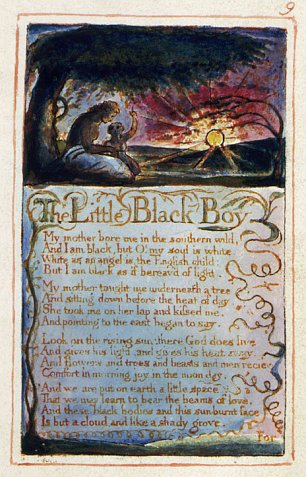
William Blake's "The Little Black Boy" (First Plate)
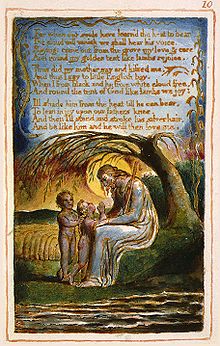
William Blake's "The Little Black Boy" (First Plate)
The Little Black Boy
My mother bore me in the southern wild,
And I am black, but O! my soul is white;
White as an angel is the English child,
But I am black, as if bereav'd of light.
My mother taught me underneath a tree,
And sitting down before the heat of day,
She took me on her lap and kissed me,
And pointing to the east, began to say:
Look on the rising sun: there God does live,
And gives his light, and gives his heat away;
And flowers and trees and beasts and men receive
Comfort in morning, joy in the noonday.
And we are put on earth a little space,
That we may learn to bear the beams of love;
And these black bodies and this sunburnt face
Is but a cloud, and like a shady grove.
For when our souls have learn'd the heat to bear,
The cloud will vanish; we shall hear his voice,
Saying: "Come out from the grove, my love & care,
And round my golden tent like lambs rejoice.''
Thus did my mother say, and kissed me;
And thus I say to little English boy:
When I from black and he from white cloud free,
And round the tent of God like lambs we joy,
I'll shade him from the heat, till he can bear
To lean in joy upon our father's knee;
And then I'll stand and stroke his silver hair,
And be like him, and he will then love me.
Blake also spoke clearly and forthrightly for equality between the races in his
visual art. He depicted the horrors of racism and slavery more graphically than he did
any other horrors ...
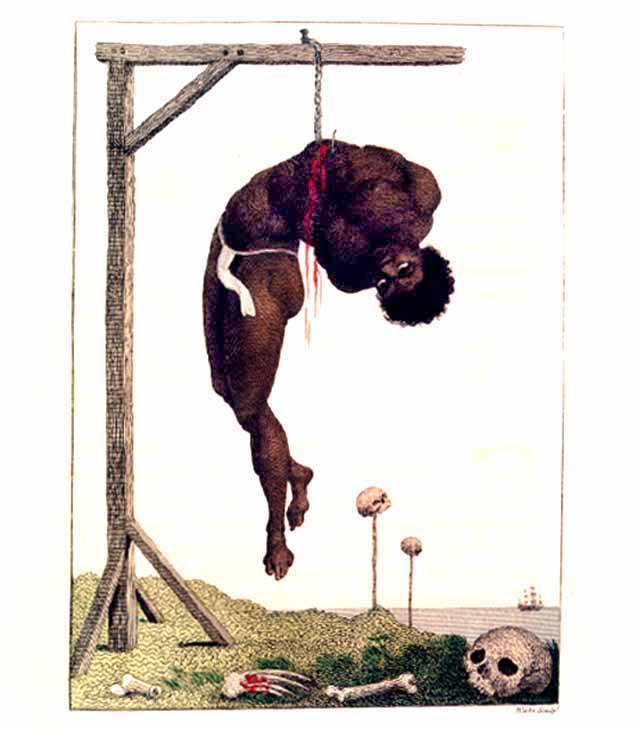
William Blake's "A Negro Hung Alive"
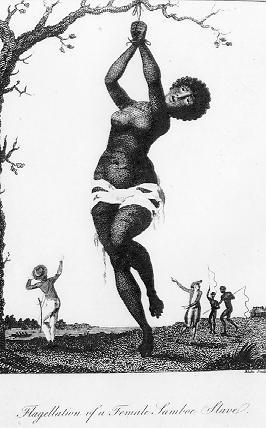
William Blake's "Flagellation of a Female Samboe Slave"
... but he seemed to go beyond that to "connect" the suffering of slaves with
the lot of suffering mankind, even poets, symbolized in the second image below by Los ...
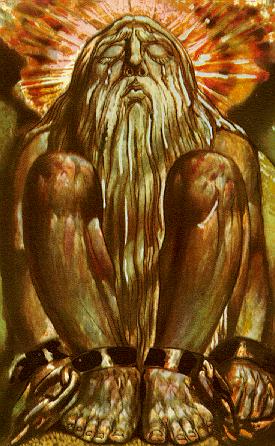
William Blake's "Urizen in Fetters, Tears streaming from His Eyes"
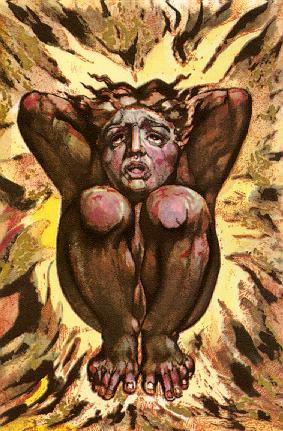
William Blake's "Los, Symbol of Poetic Genius, Consumed by Flames"
Blake and other early Romantic poets including William Wordsworth, Samuel Taylor
Coleridge and Robert Southey, opposed slavery. In 1796 John Gabriel Stedman, a
mercenary, published his memoirs of a five-year expedition against ex-slaves in
Surinam; his book included a number of engraved illustrations by Blake depicting
the horrifically cruel treatment of recaptured slaves. The first of these engravings has been "construed as an
explicit attack on the slave trade" because Blake depicted "the skulls of the
murdered slaves looking out over the sea to a slave ship in the distance while
the most recent victim of plantation cruelty swings on the gallows in the
foreground." These images were unique at that time for their graphic depiction of human suffering.
Stedman's book and Blake's illustrations became part of abolitionist literature.
According to the "William Blake Biography" the poet was a "prophet against empire" who opposed slavery
"over the course of his lifetime." Through his poetry and art "he was able both to counter pro-slavery propaganda
and to complicate typical abolitionist verse and sentiment with a profound and unique exploration of the effects
of enslavement and the varied processes of empire."
According to the same biography, Blake's Visions of the Daughters of Albion (1793) "explores the psychologically
damaging effects of enslavement upon its victims and also caricatures the political debate over
abolition in Britain. The triangular relationship between Oothoon the female
slave, Bromion the slave-driver, and Theotormon the jealous but inhibited former
lover, depicts the sufferings of those subjugated by the trade itself and mimics
the position of the pro-slavery, vested-interest lobby and that of wavering
abolitionists [who opposed slavery in theory without strongly opposing its
actual practice] ..."
The biography concludes: "Blake was among the few British writers
who actively advocated slave rebellion and believed that it was at the edges of
empire that true revolutions would occur."
Blake, the Mystic
Blake was perhaps the most spiritual and mystical of English poets. He recorded having
visions of angels and said that he saw and conversed with the angel Gabriel, Mary, and various historical figures. At age four he had a vision of God
looking at him through a window. Around age nine he had a vision of "a tree
filled with angels, bright angelic wings bespangling every bough like stars." On
another occasion, Blake "watched haymakers at work and thought he saw angelic
figures walking among them." Blake also believed that he was personally
instructed and encouraged by Archangels.
In a letter to John Flaxman, dated 21 September 1800, Blake wrote: "[The town
of] Felpham is a sweet place for Study, because it is more spiritual than
London. Heaven opens here on all sides her golden Gates; her windows are not
obstructed by vapours; voices of Celestial inhabitants are more distinctly
heard, & their forms more distinctly seen; & my Cottage is also a Shadow of
their houses. My Wife & Sister are both well, courting Neptune for an embrace...
I am more famed in Heaven for my works than I could well conceive. In my Brain
are studies & Chambers filled with books & pictures of old, which I wrote &
painted in ages of Eternity before my mortal life; & those works are the delight
& Study of Archangels."
In a letter to Thomas Butts, dated 25 April 1803, Blake wrote: "Now I may say to
you, what perhaps I should not dare to say to anyone else: That I can alone
carry on my visionary studies in London unannoy'd, & that I may converse with my
friends in Eternity, See Visions, Dream Dreams & prophecy & speak Parables
unobserv'd & at liberty from the Doubts of other Mortals; perhaps Doubts
proceeding from Kindness, but Doubts are always pernicious, Especially when we
Doubt our Friends."
In some of his more mystical passages Blake wrote:
"To see a world in a grain of sand
And heaven in a wild flower
Hold infinity in the palm of your hand
And eternity in an hour."
"If the doors of perception were cleansed
everything would appear to man as it is:
Infinite."
"He who binds to himself a joy,
Does the winged life destroy;
He who kisses the joy as it flies,
Lives in Eternity's sun rise."
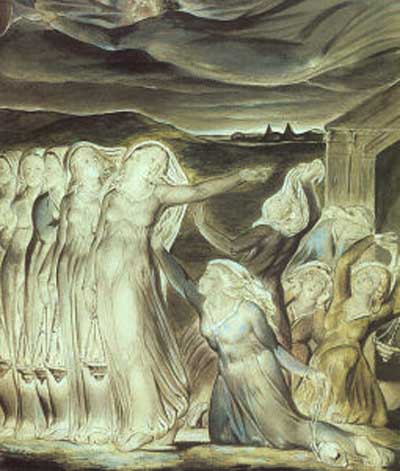
William Blake's "The Parable of the Wise & Foolish Virgins"
Blake, the Genius
According to Jonathan Jones, art critic for The Guardian, Blake is "far
and away the greatest [visual] artist Britain has ever produced." Blake has also
been included among the top forty artists of all time by G. Fernández and has
been called one of the greatest artists by John Ruskin, John Maynard, Henry
Fuseli, John Flaxman, Alexander Gilchrist and Ita Marguet, among others. Harold
Bloom, perhaps the best-known of modern literary critics, included Blake in his
list of the 100 greatest geniuses of all time, calling him a visionary akin to
Dante, Milton and Shelley. But perhaps the best measure of the genius of William
Blake is his influence on other poets and artists, including especially the
Romantics, and through them the Modernists and Post-Modernists. William
Wordsworth, the leading figure among the early Romantics, offered this verdict
after Blake's death: "There was no doubt that this poor man was mad, but there
is something in the madness of this man which interests me more than the sanity
of Lord Byron and Walter Scott."
Blake might be considered the first major Romantic poet, because he
combined imagination and individuality with contempt for mindless orthodoxy. He
was a modern Prometheus, shaking off the chains of orthodoxy and
authoritarianism, to seek the holy inner fire of passionate imagination.
Blake, the Forerunner of Whitman
Blake's "long, flowing lines and violent energy, combined with aphoristic
clarity and moments of lyric tenderness" heralded the free verse of poets like
Whitman. Where poets of the past had been poets of form and
precision, Blake was a poet of freer-flowing energy, passion and imagination. After Blake,
poets like Alexander Pope would often seem conventional and dull, for all their
talent, skill and dexterity. Blake raised the bar by caring deeply about his
subjects, and by requiring his readers to care and respond passionately in return.
Blake's Influence on other Artists
Blake also influenced the pre-Raphaelites, Allen Ginsburg and the
Beat poets, the Underground Movement, the "counter culture," Percy Bysshe
Shelley, Algernon Charles Swinburne, James Joyce, W. B. Yeats, T. S. Eliot, C.
S. Lewis, Bob Dylan, Patti Smith, U2, Salman Rushdie, Phillip Pullman ("His Dark
Materials"), Orson Scott Card, et al. The modern graphic novel can clearly trace its
roots to Blake's illuminated poems and prophetic books. And it seems likely that
every major anti-war and anti-orthodoxy figure since Blake has been influenced
to some degree by him.
Jim Morrison based the name of his rock group, the Doors,
on Blake's "doors of perception."
Bob Dylan collaborated with Allen Ginsberg to record two Blake songs. Ginsberg
even claimed that Blake's spirit had communicated musical settings of several Blake poems
to him. In 1948 he had an auditory hallucination of Blake reading his poems "Ah,
Sunflower," "The Sick Rose," and "Little Girl Lost" (later referred to as his
"Blake vision"). Patti Smith was heavily influenced by Blake, referring to him
in her song "My Blakean Year" and also reciting his poetry
before some of her songs.
William Rossetti called Blake a "glorious luminary," and described him as "a man
not forestalled by predecessors, nor to be classed with contemporaries, nor to
be replaced by known or readily surmisable successors."
Blake, the Advocate of Women and Free Love
In 1793's Visions of the Daughters of Albion, Blake "condemned the
cruel absurdity of enforced chastity and marriage without love and defended the
right of women to complete self-fulfillment." He abhorred the black-robed
priests of organized religion who erected a "Thou shalt not" sign over his
garden of earthly love ...
The Garden Of Love
by William Blake
I laid me down upon a bank,
Where Love lay sleeping;
I heard among the rushes dank
Weeping, weeping.
Then I went to the heath and the wild,
To the thistles and thorns of the waste;
And they told me how they were beguiled,
Driven out, and compelled to the chaste.
I went to the Garden of Love,
And saw what I never had seen;
A Chapel was built in the midst,
Where I used to play on the green.
And the gates of this Chapel were shut
And "Thou shalt not," writ over the door;
So I turned to the Garden of Love
That so many sweet flowers bore.
And I saw it was filled with graves,
And tombstones where flowers should be;
And priests in black gowns were walking their rounds,
And binding with briars my joys and desires.
Blake, the Inventor
Blake was the inventor of relief etching, or illuminated printing, a method he
used to produce most of his books, paintings, pamphlets and poems. He also
employed intaglio engraving, most notably for the illustrations of the Book of
Job.
Blake, the Anarchist
Blake's trouble with authority came to a head in August 1803, when he was
involved in a physical altercation with a soldier called John Schofield. Blake
was charged not only with assault, but also with uttering seditious and
treasonable expressions against the King. Schofield claimed that Blake had
exclaimed, "Damn the king. The soldiers are all slaves." Blake would be cleared
in the Chichester assizes of the charges. According to a report in the Sussex
county paper, "The invented character of [the evidence] was ... so obvious that
an acquittal resulted." Schofield was later depicted wearing "mind forged
manacles" in an illustration to Jerusalem.
Blake revolted against the established institutions of his time, saying:
"Prisons are built with stones of Law, brothels with bricks of Religion."
He sided with the rebellious fallen angels of Milton's "Paradise Lost" and
attacked conventional religious views, particularly those that called sex "evil"
and thus opposed human happiness. Some of Blake's contemporaries called
him a harmless lunatic, but by advocating free love and opposing misery-inducing
religious orthodoxy, he was simply light years ahead of his time. In Blake's
case it
seems madness really is "divinest sense."
Blake, the Prophet of Freedom and Tolerance
One of Blake's lifelong concerns was to free the soul and its natural energies from
the hidebound "reason" of organized religion. He hated the grimy, sooty effects
of the Industrial Revolution in England and looked forward to the establishment
of a New Jerusalem "in England's green and pleasant land." His personal religion was
freedom, tolerance and the pursuit of happiness, without artificial limitations
and impediments. To him, religious orthodoxy was like a speed bump in the middle
of racetrack. He had a heart of all human suffering. But perhaps his greatest
enduring legacy is his tender empathy for children, and his fierce, passionate defense of them.
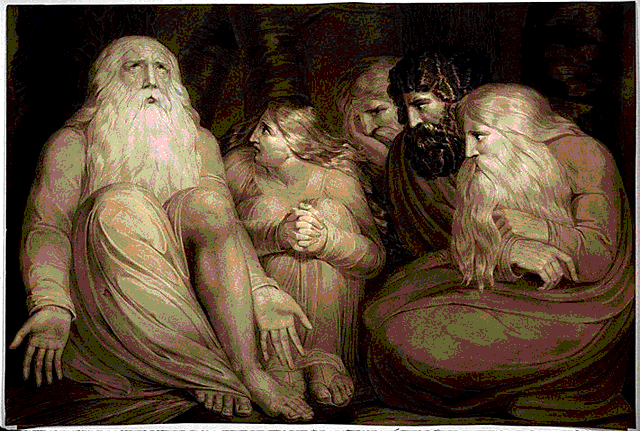
William Blake's "Job"
The Heresies of William Blake
William Blake was a heretic who wrote:
The Vision of Christ that thou dost See
Is my Visions Greatest Enemy
…
Both read the Bible day & night
But thou readst black where I read White.
In the next poem Blake explicitly identified the Judaic/Christian creator-god with the Devil. Please keep in mind that Christians call Satan “the accuser of the brethren” and the “son
of the morning” …
To the Accuser Who Is the God of this World
Truly, my Satan, thou art but a Dunce,
And dost not know the Garment of the Man.
Every Harlot was a Virgin once,
Nor canst thou ever change Kate into Nan.
Tho’ thou art Worship’d by the Names Divine
Of Jesus and Jehovah, thou are still
The Son of Morn in weary Night’s decline,
The lost Traveller’s Dream under the Hill.
Blake saw Jesus as a good man and role model, not as a “savior,” and wrote in his criticism of Christian apologetics:
“all […] codes given under pretence of divine command were what Christ pronounced them, The Abomination that maketh desolate, i.e. State Religion” and later in the same text, “The
Beast & the Whore rule without control.”
I take the Beast to be the devilish biblical “god” and the Whore to be the church in the guise of a state religion (which now threatens American democracy).
Blake wrote companion poems “The Lamb” and “The Tyger” in which he condemned the Creator. In the first poem, misread if one reads it alone, he asked:
Little Lamb, who made thee?
Dost thou know who made thee?
In “The Tyger” he disputed the Christian dogma of a benevolent Creator, asking the savage predator:
Did he who make the Lamb make thee?
Blake reversed the Bible’s ludicrous “original sin” episode and called the Christian church a “serpent temple” and its “god” a “tyrant crown’d”:
Then was the serpent temple form’d, image of infinite
Shut up in finite revolutions, and man became an Angel;
Heaven a mighty circle turning; God a tyrant crown’d.
Blake saw himself as a warrior engaged in a “mental fight” with the three-headed hydra of church, state and industry:
I will not cease from Mental Fight,
Nor shall my Sword sleep in my hand:
Till we have built Jerusalem,
In Englands green & pleasant Land.
Blake had a number of heretical opinions, among them that the Creator is the author of all evil; that Nature is not good but evil and humans and animals are its victims; that organized religion is Devil
worship; and that human beings must free themselves from the incorrect ideas of religion, which Blake called the “mind-forged manacles.”
Blake was also ahead of his time in advocating free love, tolerance for people of all races, the abolition of slavery, the abolition of child labor, etc.
One might call William Blake the "original flower child."
BLAKEAN POEMS
by Michael R. Burch
Ah! Sunflower
by Michael R. Burch
for and after William Blake
O little yellow flower
like a star ...
how beautiful,
how wonderful
we are!
The Difference
by Michael R. Burch
The chimneysweeps
will weep
for Blake,
who wrote his poems
for their dear sake.
The critics clap,
polite, for you.
Another poem
for poets,
Whooo!
Orpheus, or, William Blake's Whistle
by Michael R. Burch
for and after William Blake
I.
Many a sun
and many a moon
I walked the earth
and whistled a tune.
I did not whistle
as I worked:
the whistle was my work.
I shirked
nothing I saw
and made a rhyme
to children at play
and hard time.
II.
Among the prisoners
I saw
the leaden manacles
of Law,
the heavy ball and chain,
the quirt.
And yet I whistled
at my work.
III.
Among the children’s
daisy faces
and in the women’s
frowsy laces,
I saw redemption,
and I smiled.
Satanic millers,
unbeguiled,
were swayed by neither girl,
nor child,
nor any God of Love.
Yet mild
I whistled at my work,
and Song
broke out,
ere long.
A Passing Observation about Thinking Outside the Box
by Michael R. Burch
William Blake had no public, and yet he’s still read.
His critics are dead.
evol-u-shun
by michael r. burch
for and after william blake
does GOD adore the Tyger
while it’s ripping ur lamb apart?
does GOD applaud the Plague
while it’s eating u ŕ la carte?
does GOD admire ur brains
while ur claimng IT has a heart?
does GOD endorse the Bible
you blue-lighted at k-mart?
In the segmented title “evol” is “love” spelled backwards:
thus "love u shun." The title
questions whether you/we have been shunned by a "God of Love" and/or by
evolution. William Blake’s poem “The Tyger” questions the nature of
a Creator who brings innocent lambs and savage tigers into the same world.
the echoless green
by michael r. burch
for and after William Blake
at dawn, laughter rang
on the echoing green
as children at play
greeted the day.
by noon, smiles were seen
on the echoing green
as, children no more,
many fine oaths they swore.
come twilight, their cries
had subsided to sighs.
now Night reigns supreme
on the echoless green.
blake take
by michael r. burch
we became ashamed of our bodies;
we became ashamed of sweet sex;
we became ashamed of the LORD
for each terrible CURSE and HEX;
we became ashamed of the planet
(it’s such a slovenly hovel);
and we came to see, in the end,
that we really agreed with the devil.
dark matter(s)
by michael r. burch
for and after William Blake
the matter is dark, despairful, alarming:
ur Creator is hardly prince charming!
yes, ur “Great I Am”
created blake’s lamb
but He also created the tyger ...
and what about trump and rod steiger?
Rod Steiger is best known for his portrayals of weirdos, oddballs, mobsters,
bandits, serial killers, and fascists like Mussolini and Napoleon.
tyger, lamb, free love, etc.
by michael r. burch
for and after william blake
the tiger’s a ferocious slayer.
he has no say in it.
hence, ur Creator’s a shit.
the lamb led to the slaughter
extends her neck to the block and bit.
she has no say in it.
so don’t be a nitwit:
drink, carouse and revel!
why obey the Devil?
beMused
by Michael R. Burch
Perhaps at three
you'll come to tea,
to have a cuppa here?
You'll just stop in
to sip dry gin?
I only have a beer.
To name the “greats”:
Pope, Dryden, mates?
The whole world knows their names.
Discuss the “songs”
of Emerson?
But these are children's games.
Give me rhythms
wild as Dylan’s!
Give me Bobbie Burns!
Give me Psalms,
or Hopkins’ poems,
Hart Crane’s, if he returns!
Or Langston railing!
Blake assailing!
Few others I desire.
Or go away,
yes, leave today:
your tepid poets tire.
I Learned Too Late
by Michael R. Burch
“Show, don’t tell!”
I learned too late that poetry has rules,
although they may be rules for greater fools.
In any case, by dodging rules and schools,
I avoided useless duels.
I learned too late that sentiment is bad—
that Blake and Keats and Plath had all been had.
In any case, by following my heart,
I learned to walk apart.
I learned too late that “telling” is a crime.
Did Shakespeare know? Is Milton doing time?
In any case, by telling, I admit:
I think such rules are shit.
Mongrel Dreams (II)
by Michael R. Burch
for Thomas Rain Crowe
I squat in my Cherokee lodge, this crude wooden hutch of dry branches and
leaf-thatch
as the embers smolder and burn,
hearing always the distant tom-toms of your rain dance.
I relax in my rustic shack on the heroned shores of Gwynedd,
slandering the English in the amulet gleam of the North Atlantic,
hearing your troubadour’s songs, remembering Dylan.
I stand in my rough woolen kilt in the tall highland heather
feeling the freezing winds through the trees leaning sideways,
hearing your bagpipes’ lament, dreaming of Burns.
I slave in my drab English hovel, tabulating rents
while dreaming of Blake and burning your poems like incense.
I abide in my pale mongrel flesh, writing in Nashville
as the thunderbolts flash and the spring rains spill,
till the quill gently bleeds and the white page fills,
dreaming of Whitman, calling you brother.
Related pages: The Best Poems and Art of William Blake,
William Blake Famous Poems,
William Blake's Influence,
William Blake's Angels,
William Blake: Heretic,
William Blake's Jesus Christ,
William Blake's God
The HyperTexts
![[Blake Print - Jacob's Ladder]](images/William%20Blake%20Jacobs%20Ladder.jpg)


![[Blake Print - Jacob's Ladder]](images/William%20Blake%20Jacobs%20Ladder.jpg)

![[Blake Print - Hecate]](images/William%20Blake%20Hecate.jpg)






![[Blake Print - Songs of Innocence]](images/William%20Blake%20Songs%20of%20Innocence.jpg)







